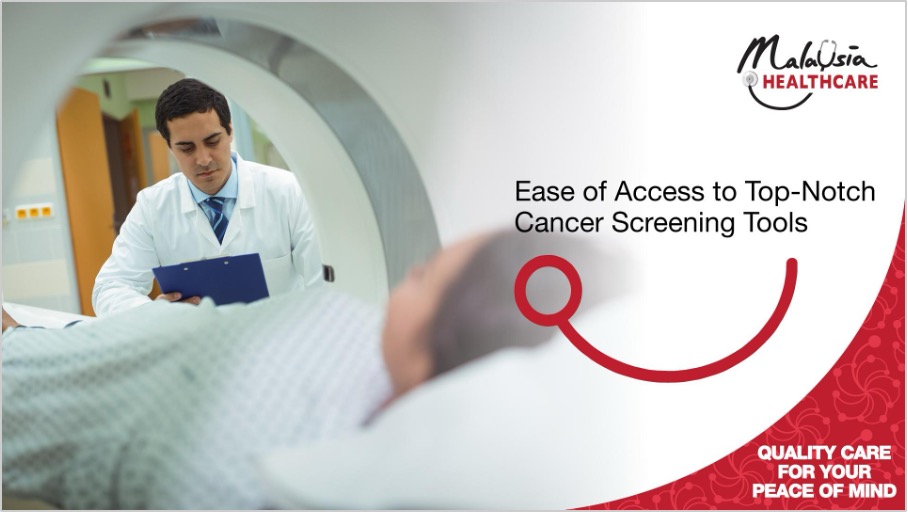Medical Care , Health & Wellness , Oncology (Cancer) , Medical Tourism News
Ease of Access to Top-Notch Cancer Screening Technology
Malaysia, aspiring to be the main cancer treatment hub in Asia, sets out to provide excellent cancer care services with advanced cancer screening innovations.

Cancer is a leading cause of death globally. Nevertheless, early identification of the disease has been linked to lower mortality rates, with the survival rate at one and five years for most cancers being higher if the cancer is detected at the first stage[1] and treated early.
Malaysia, as a Cancer Care Centre of Excellence in the region, is a top-of-mind destination among healthcare travellers. This is due, in part, to the country’s commitment to cutting-edge cancer screening and treatment capabilities as well as its quality patient care and service.
According to Dr. Aqilah Othman, Consultant Clinical Oncologist at Sunway Medical Centre, cancer screening allows doctors to detect any abnormal growth or lumps in the body. “These may be benign or at a precancerous stage. The removal of these lesions can reduce the risk of them transforming into cancer,” she added.
Alongside a better prognosis, early cancer detection may reduce the need for more intrusive and aggressive therapies. For instance, a tiny and localised tumour may require less invasive treatments or less extensive surgeries, leading to a lower risk of complications and faster recovery. Early detection of the disease could also lessen the need for systemic treatments with possibly more harmful side effects or for prolonged radiation therapy.
Malaysia stands at the forefront in implementing advanced and modern cancer screening tools in order to optimise the treatment quality and patient care. Sunway Medical Centre is equipped with a Digital Positron Emission Tomography/Computed Tomography (PET/CT) scanner, for one.
“A Digital PET/CT scanner can support higher quality imaging, which helps nuclear medicine physicians to detect even the tiniest lesions in a patient’s body. On top of that, we also use the M2PK Stool test, which is a visual immunochromatographic rapid test that is used to detect the M2-pyruvate kinase (M2-PK) enzyme in stool samples for colorectal cancer screening,” shared Dr. Heng Siew Peng, General Manager of the Cancer Centre at Sunway Medical Centre.
Malaysia is also home to a first-in-Asia Mediso AnyScan hybrid imaging system. Located in Thomson Hospital Kota Damansara, this hybrid imaging system is capable of carrying out all contemporary nuclear medicine operations, including both PET and single-photon emission computed tomography (SPECT) imaging. The machine integrates the characteristics of these two imaging modalities into a single device, providing for a wide range of diagnostic capabilities. This gives medical practitioners extensive information on their patients’ functional and anatomical characteristics as well as assisting in diagnosis and therapy planning.
With top-notch cancer screening tools, Malaysia is able to provide patients with more accurate and precise cancer diagnoses. The location, size and metabolic activity of tumours can all be precisely determined with advanced and modern imaging technologies. This aids medical professionals in developing action plans that can precisely target cancerous cells or particular molecular networks that drive the development and spread of cancer. Understanding a tumour's molecular profile allows medical professionals to choose the most targeted therapy, improving the likelihood of successful treatment while minimising harm to healthy tissues.
The majority of private hospitals in Malaysia are set up to provide screening, diagnosis, treatment and follow-up care for all cancer-related treatments in one convenient location. Therefore, those who travel for healthcare and need cancer treatment have a lot of discretion in selecting the facility that best suits their needs. Additionally, they are also assured of prompt care and treatment because there is typically little to no waiting time for an appointment.
For more information on Malaysia Healthcare and its services, please visit https://malaysiahealthcare.org.my or visit our social feeds at: www.facebook.com/MHTCMalaysia or at LinkedIn (Malaysia Healthcare Travel Council).
Reference Links:
[1] https://www.bmj.com/content/364/bmj.l408
ABOUT THE MALAYSIA HEALTHCARE TRAVEL COUNCIL
The Malaysia Healthcare Travel Council (MHTC) is a government agency under the Ministry of Health Malaysia that has been entrusted with the responsibility of curating the country’s healthcare travel scene. Founded in 2009, MHTC works to streamline industry players and service providers in facilitating and growing Malaysia’s healthcare travel industry under the brand “Malaysia Healthcare” with the intended goal of making Malaysia the leading global healthcare destination. MHTC works closely with over 80 private healthcare facilities in Malaysia, who are registered members of MHTC.
Related Articles
Health & Wellness
How to Deal with Obesity & Diabetes?
The prevalence of obesity in the world have continued to increase significantly. It is estimated by WHO that 39% of adults aged 18 years and over were overweight in 2016, and 13% were obese.
Read moreMedical Care
Blood delivery drone due to become world’s fastest
New-generation drones slash delivery time of life-saving blood products and medicines in hard-to-reach areas in Rwanda
Read moreMedical Care
Better use your nose
In the long term, mouth breathing might lead to several complications
Read moreLatest Articles
Medical Care
Clinical Exercise Physiologist (CEP): The Emerging of Exercise is Medicine
How Exercising can be a Medicine
Read moreMedical Care
Reversing type 2 Diabetes: Embracing Hope and Determination
Experience the remarkable journey of Ash and his grandfather Atok as they conquer type 2 diabetes through unconventional methods, showcasing the power of love and determination over adversity.
Read moreMedical Care
Bladder Cancer: What You Need to Know
Empower yourself with our comprehensive guide to bladder cancer. Explore symptoms, diagnosis, treatments, and supportive resources to safeguard your health.
Read more